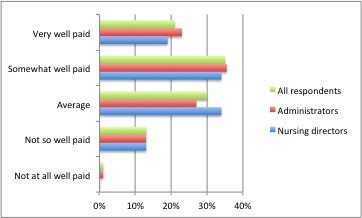
While long-term care managers are generally satisfied with their job and overwhelmingly believe they are doing “meaningful” work, their satisfaction with pay has slipped considerably over the last year.
Satisfaction with pay levels dropped a net 15% from mid-2019 to mid-2020, according to the latest McKnight’s Long-Term Care News Mood of the Market survey.
Contentment in the upper ranges was down to 56% overall among all respondents, with 21% saying they were “very well paid” and 35% saying “somewhat well paid.” That’s a fall from 66% combined in the 2019 Mood of the Market Survey.
Once again, administrators polled higher than nursing directors in pay satisfaction, 58% to 53% in the top two categories this year.

The findings are not necessarily surprising, given recent hectic, anxious pandemic conditions, said compensation and benefits expert Mark Heston of Heston & Associates.
“They probably would say the pay has not kept up with the extra effort,” he noted.
Even though operators have been cash-strapped due to expansive personal protective equipment and testing needs, as well as added staffing costs, they need to remain strongly supportive of their workers, one expert cautioned.
“I can tell you from other downturns [in the economy] that the organization that has taken advantage of employees during downturns, those employees, once the market turns around, are not going to be very loyal soldiers,” explained Matt Leach, principal and senior consultant for Total Compensation Solutions. “There’s a universal feeling if your company takes care of you but doesn’t take advantage of you during downturns, you’ll be a much happier employee and much more likely to stay during the good times.”
Leach also explained that long-term care managers may have more options to move than before. Several decades ago, they might have felt less inclined to bolt to other settings, but places such as hospitals, with more competitive pay and work schedules, could draw away talent.
Overworked?
Answers to one of the new questions on this year’s survey surprised the experts. Respondents were almost evenly split on whether they were asked to do too much work; nurses (at 57%) tilted much higher than the administrators (43%) on the feelings of burden.

Overall, 13% of respondents said “very much so, yes;” 36% said “generally yes;” 42% checked “generally no;” and 8% said “No, I don’t think that at all” when queried if they are asked to do too much.
“I would have thought it would have been higher (toward too much work),” Heston said. “Part of it might be the type of people and professionals you have here. They work hard and take the opinion, ‘We’re going to get done what has to get done.’ They’re used to this.”
Previous installments of the 2020 Mood of the Market Survey results can be found at this page and here.
Tomorrow: Changes wanted and supervisor confidence




